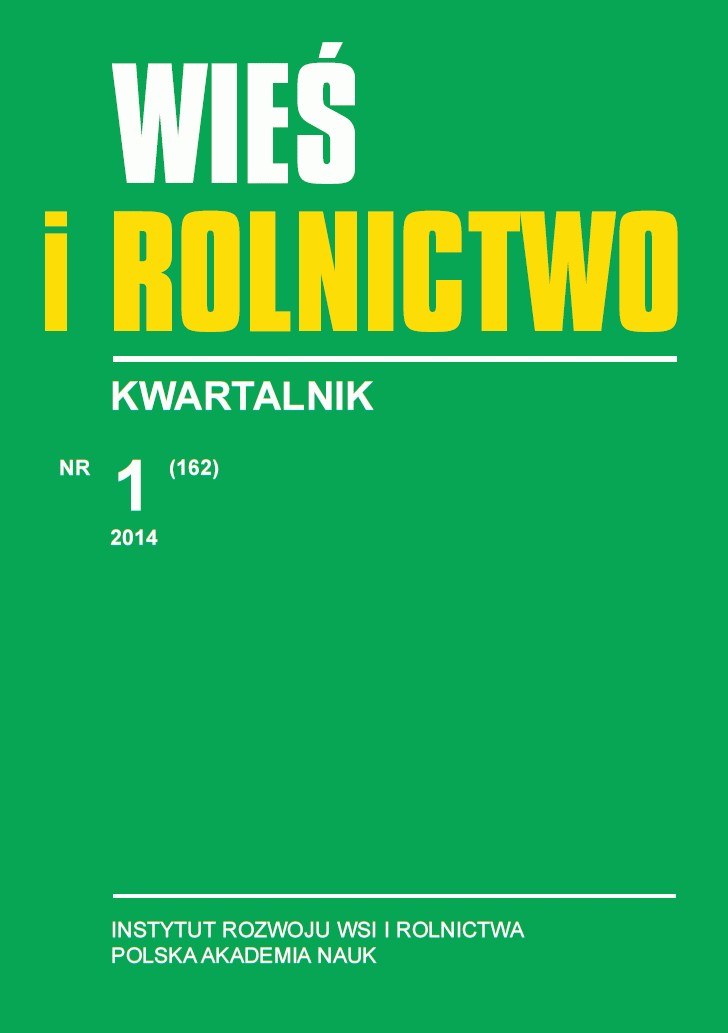Notes concerning the reorientation of the approach to a process of adaptation to demographic changes in Europe
DOI:
https://doi.org/10.53098/wir.2014.1.162/01Keywords:
new demography of Europe, renewal of demography, adaptation to demographic change, family policy, social investmentAbstract
Changes in the process of European recovery of generations has led to the emergence of a new population order on the continent known as the “New Demography of Europe”. This has permanently redefined different conditions for the development of the continent. Understanding the nature of these changes is reflected in discussion on how to change and adjust the economy and institutions of European countries. The main subject of this discussion is the reorientation of the approach to the constructive response to demographic change in Europe [EC, 2006]. This is preceded by a short description of the basics of conversion of Europe's demography.References
Addressing the Challenges of Europe’s New Demography. Population Network Newsletter Popnet, No. 35, Summer 2003.
Bijak J., Kupiszewska D., Kupiszewska M., 2008: Replacement Migration Revisited: Simulations of the Effects of Selected Population and Labor Market Strategies for the Aging Europe, 2002–2052. Population Research and Policy Review No. 27, p. 321–342. DOI: https://doi.org/10.1007/s11113-007-9065-2
Burniaux J., Duval R. and Jaumotte F., 2003: Coping with Ageing: a Dynamic Approach to Quantify the Impact of Alternative Policy Options on Future Labour Supply in OECD Countries. OECD Economics Working Papers No. 371. www.oecd.org/dataoecd/49/29/20686301.htm
Coleman D., 2009: Migration and its consequences in 21st century Europe. Vienna Yearbook of Population Research, Special issue on „Impact of migration on demographic change and composition in Europe”, p. 1–18.
Daly M., 2004: Unmet needs and risks: the significance of changing family life for social policy in Europe/EU. [w:] Families, Change and Social Policy in Europe, materiały konferencyjne, Irish Presidency Conference, Dublin Castle, Dublin, Ireland, 13–14 maja 2004 r., s. 64–93.
Dobry klimat dla rodziny. Program Polityki Rodzinnej Prezydenta RP, Warszawa 2013.
European Council, 2000: Presidency Conclusions. Lisbon, 23–24 March 2000.
(EC) European Commission, 2004: The social situation in the European Union 2004, Brussels.
(EC) European Commission, 2005: Green Paper: Confronting Demographic Change: a New Solidarity between the Generations. Communication from the Commission, Brussels, COM (2005) 94 final.
(EC) European Commission, 2006: The Demographic Future of Europe – from Challenge to Opportunity. Communication from the Commission, Brussels, COM(2006) 571 final.
(EC) European Commission, 2007: Promoting Solidarity between the Generations. Brussels, COM(2007) 244.
(EC) European Commission, 2008a: Communication from the Commission to the European Parliament, the Council, the European Economic and Social Committee and the Committee of the Regions: A better Work-Life Balance: Stronger Support for Reconciling Professional, Private and Family Life. Brussels, COM(2008) 635 final.
(EC) European Commission, 2008b: Demography Report 2008. Meeting Social Needs in an Ageing Society. SEC (2008) 2911.
(EC) European Commission, 2009: The 2009 Ageing Report. Economic and budgetary projections for the EU-27 Member States (2008–2060), European Economy No 2.
(EC) European Commission, 2010: Communication from the Commission to the Council, the European Parliament, the European Economic and Social Committee and the Committee of the Regions: The Strategy for Equality between Women and Men, 2010–2015. Brussels, COM (2010) 491 final.
(EC) European Commission, 2012: The 2012 Ageing Report. Economic and budgetary projections for the 27 EU Member States (2010–2060). European Economy No. 2.
Esping-Andersen G., 1999: Social Foundations of Post-industrial Economies. Oxford University Press, Oxford. DOI: https://doi.org/10.1093/0198742002.001.0001
Esping-Andersen G., 2009: The Incomplete Revolution. Adapting to Women’s New Roles. Polity Press, Cambridge.
Esping-Andersen G., Duncan G., Hemmerijck A., John Myles J., 2002: Why We Need a New Welfare State. Oxford University Press, Oxford. DOI: https://doi.org/10.1093/0199256438.001.0001
Gauthier A., 2004: Choices, opportunities and constraints on partnership, childbearing and parenting: the policy responses, Background paper for Childbearing and parenting in low fertility countries: enabling choices. European Population Forum 2004: Population Challenges and Policy Responses, UN Economic Commission for Europe, Population Activity Unit, January 2004, Geneva.
Hantrais L., 2004: Critical analysis of responses to family change: adapting the EU social policy agenda. [w:] Families, Change and Social Policy in Europe, materiały konferencyjne, Irish Presidency Conference, Dublin Castle, Dublin, Ireland, 13–14 maja 2004 r., s. 96–118.
Hemmerijck A., 2012: Changing Welfare States. Oxford University Press, Oxford.
Knijn T. (red.), 2012: Work, Family Policies and Transitions to Adulthood in Europe. Work and Welfare in Europe Series, Palgrave Macmillan, London. DOI: https://doi.org/10.1057/9781137284198
Kotowska I.E., 2010: Uwagi o polityce łączenia pracy zawodowej i rodziny w kontekście nowej demografii Europy i zmian na rynku pracy. [w:] Człowiek w pracy i polityce społecznej, J. Szambelańczyk, M. Żukowski (red.). Wydawnictwo Uniwersytetu Ekonomicznego w Poznaniu.
Kotowska I.E., Jóźwiak J., 2012: Nowa demografia Europy a rodzina. Roczniki Kolegium Analiz Ekonomicznych, Zeszyt 28/2012, s. 9–33.
Kotowska I.E., Chłoń-Domińczak A., 2012: Zarządzanie finansami publicznymi w kontekście zmiany demograficznej. Studia Ekonomiczne nr 1, s. 7–26.
Lutz W., O’Neill B., Scherbov S., 2003: Europe’s population at a turning point. Science No. 299 (28), s. 1991–1992. DOI: https://doi.org/10.1126/science.1080316
Morel N., Palier B., Palme J. (red.), 2012: Towards a Social Investment Welfare State? Ideas, Policies, Challenges. University of Bristol: The Policy Press, Bristol. DOI: https://doi.org/10.1332/policypress/9781847429247.001.0001
OECD, 2001: Balancing work and family life: helping parents into paid employment. Employment Outlook, Chapter 4, s. 129–166.
OECD, 2009: Doing better for children. OECD Publishing, doi: 10.1787/9789264059344-en. DOI: https://doi.org/10.1787/9789264059344-en
OECD, 2011: Doing better for families. OECD Publishing, doi: 10.1787/9789264098732-en. DOI: https://doi.org/10.1787/9789264098732-en
OECD, 2012: Closing the Gender Gap. Act Now. OECD Publishing, doi: 10.1787/9789264179370-en. DOI: https://doi.org/10.1787/9789264179370-en
Polska 2030. Wyzwania rozwojowe. Kancelaria Prezesa Rady Ministrów, Warszawa 2009.
Vandenbroucke F., Hemmerijck A., Palier B., 2011: The EU Needs a Social Investment Pact. OSE Paper Series, Opinion paper No. 5, May 2011.
Vignon J., 2005: Responses to the New Demographics in Europe – Present and Future Strategies for the European Union. [w:] The New Demographic Regime, Population Challenges and Policy Responses, M. Macura, A.L. MacDonald, W. Haug (red.). United Nations, New York and Geneva, s. 45–56.
Downloads
Article file downloads
Pages
How to Cite
Issue
Section
License
Copyright (c) 2014 Wieś i Rolnictwo

This work is licensed under a Creative Commons Attribution 4.0 International License.










